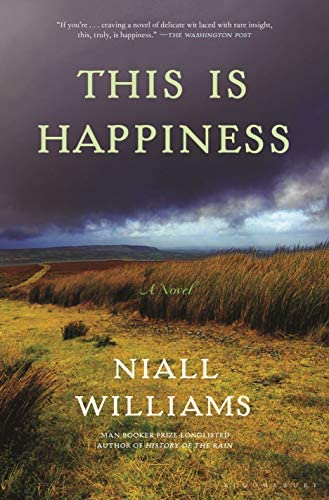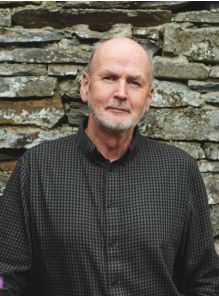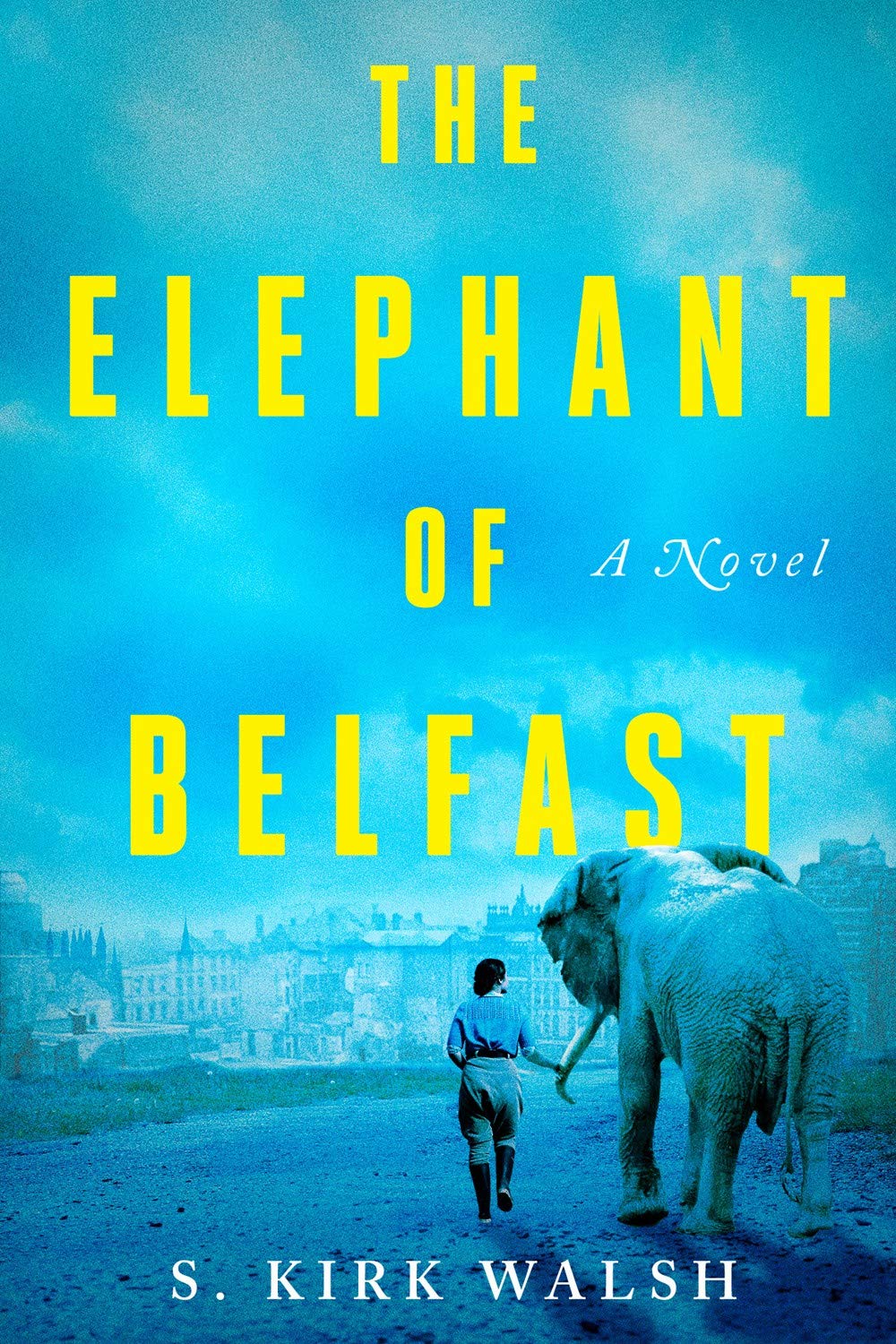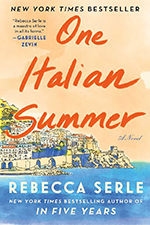 This Is Happiness
This Is Happiness
by Niall Williams
GENRE: Historical Fiction, Literary Fiction
A sleepy village in Ireland is on the precipice of change. The rain has stopped, electricity is coming, and a stranger has arrived. Seventeen-year-old Noel Crowe is living with his grandparents in the Irish parish when everything begins to change. A fiction work in the style of a memoir, This is Happiness is a community portrait and a reminiscence of a simpler time.
 Author Biography
Author Biography
Born in Dublin in 1958, studied English and French Literature at University College, Dublin. He moved to New York in 1980 where he married Christine Breen, whom he had met while she was also a student at UCD. His first job in New York was opening boxes of books in Fox & Sutherland's Bookshop in Mount Kisco. In 1985, he and Chris left America to attempt to make lives as writers in Ireland. On April 1st they moved to the cottage in west Clare that Chris's grandfather had left eighty years before. They have two adult children, a dog named Finn and a cat called Thanks.
Niall’s first four books, published between 1987 and 1995, were co-written with Chris and tell of their life together in Co Clare.
In 1991 Niall’s first play The Murphy Initiative was staged at The Abbey Theatre in Dublin. His second play, A Little Like Paradise was produced on the Peacock stage of The Abbey Theatre in 1995. His third play, The Way You Look Tonight, was produced by Galway’s Druid Theatre Company in 1999.
Niall’s first novel was Four Letters of Love. Published in 1997, it went on to become an international bestseller and has since been published in over twenty countries. It was re-issued in 2016 as a Picador Modern Classic. His second novel, As It Is In Heaven was published in 1999 and short-listed for the Irish Times Literature Prize. Further novels include The Fall of Light, Only Say the Word, Boy In the World and its sequel, Boy and Man.
In 2008 Bloomsbury published Niall’s fictional account of the last year in the life of the apostle, John.
History of the Rain, was published by Bloomsbury in May 2014. It was long-listed for the Man Booker Prize 2015, and has since been translated into several languages, including Russian.
Niall’s newest novel is This is Happiness. It was nominated for The Irish Books Award, The Walter Scott Prize, and was one of the Washington Post’s Books of the Year. Niall has written several screenplays for television and film, including the screenplay for Four Letters of Love. Several projects are in active production, including some in partnership with Christine. - Author's website
Booklist
Now an old man, Noel Crowe reflects on the spring when the eternal, infernal rains stopped pouring on the tiny hamlet of Faha and when the sun beat down with an undiscerning assurance. Along with the weather’s good tidings came the Irish government’s long-awaited promise of electrical service to this lone outpost. Christy is the man utility has charged with ushering the Fahaeans into the ways of the twentieth century. Noel was 17 then, mourning the death of his mother and living with his grandparents while pondering his fate of joining the priesthood. When Christy becomes their lodger, his presence not only heralds the vast changes that are in store for the villagers, he also provides a tutorial for Noel in the ways of the heart. It turns out that Christy is in Faha to do more than sign up new customers: he’s there to atone to Annie Mooney, the woman he left at the altar some 50 years before. With a beckoning gentleness that belies the deeper philosophies at play, superb Irish author Williams (History of the Rain, 2014) offers a lilting, magical homage to time and redemption, and a stirring, sentimental journey into the mysteries of love and the possibilities of friendship. -- Carol Haggas (Reviewed 10/1/2019) (Booklist, vol 116, number 3, p26)
Publisher's Weekly
In glorious and lyrical prose, Williams (History of the Rain) spins the tale of one 1958 season in the village of Faha, County Kerry, where young “Noe” Crowe, only 17 and already departed from the seminary, has washed up with his grandparents. The story opens on the Wednesday of Holy Week with the cessation of an almost constant rain, relieving the villagers of their life “under a fall of watery pitchforks.” To add to this wonder, the electricity is finally coming to Faha and with it a lodger at Ganga and Doady Crowe’s house. Christy McMahon is a man of broad experience who seems “as if it was he who told the world the joke of himself” and a perfect companion to Noe. During that late spring and early summer, Noe assists Christy in signing up the locals for electric service, and they spend their evenings on a quest for music at countryside pubs. Most important for Christy is his attempt to gain forgiveness from Annie Mooney, now Annie Gaffney, widow of the village chemist, a woman that Christy left at the altar decades before. Meanwhile, love springs on Noe unawares as he comes under the thrall, in succession, of each of the lovely Troy sisters, daughters of Faha’s doctor, whose attention Noe needs after an accident. Noe’s reminiscences of that period are full of beauty and hard-won wisdom. This novel is a delight. (Dec.) --Staff (Reviewed 09/23/2019) (Publishers Weekly, vol 266, issue 38)
Kirkus Reviews
The heart-expanding extremes of life—first love and last rites—are experienced by an unsettled young Dubliner spending one exceptional spring in a small Irish village. Christy McMahon "walked this line between the comic and the poignant," and so does Williams (History of the Rain, 2014, etc.) in his latest novel, another long, affectionate, meandering story, this one devoted to the small rural community of Faha, which is about to change forever with the coming of electricity to the parish. Delighting in the eccentricities of speech, behavior, and attitude of the local characters, Williams spins a tale of life lessons and loves new and old, as observed from the perspective of Noel Crowe, 17 when the book's events take place, some six decades older as he narrates them. Noel's home is in Dublin, where he was training to become a Catholic priest, but he's lost his faith and retreated to the home of his grandparents Doady and Ganga in Faha. Easter is coming, and the weather—normally infinite varieties of rain—turns sunny as electrical workers cover the countryside, erecting poles and connecting wires. Christy, a member of the electrical workforce, comes to lodge alongside Noel in Doady and Ganga's garret but has another motive: He's here to find and seek forgiveness from the woman he abandoned at the altar 50 years earlier. While tracing this quest, Williams sets Noel on his own love trajectory as he falls first for one, then all of the daughters of the local doctor. These interactions are framed against a portrait of village life—the church, the Gaelic football, the music, the alcohol—and its personalities. Warm and whimsical, sometimes sorrowful, but always expressed in curlicues of Irish lyricism, this charming book makes varied use of its electrical metaphor, not least to express the flickering pulse of humanity. A story both little and large and one that pulls out all the Irish stops. (Kirkus Reviews, October 1, 2019)
 The Magic Kingdom
The Magic Kingdom
by Russell Banks
Property speculator Harley Mann begins recording his life story onto a reel-to-reel machine, reflecting on his youth in the early twentieth century. He recounts that after his father’s sudden death, his family migrated down to Florida to join a Shaker colony. Led by Elder John, a generous man with a mysterious past, the colony devoted itself to labor, faith, and charity, rejecting all temptations that lay beyond the property. Though this way of life initially saved Harley and his family from complete ruin, when Harley began falling in love with Sadie Pratt, a consumptive patient living on the grounds, his loyalty to the Shakers and their conservative worldview grew strained and, ultimately, broke.
As Harley dictates his story across more than half a century—meditating on youth, Florida’s everchanging landscape, and the search for an American utopia—the truth about Sadie, Elder John, and the Shakers comes to light, clarifying the past and present alike. With an expert eye and stunning vision, Russell Banks delivers a wholly captivating portrait of a man navigating Americana and the passage of time.
 The Elephant of Belfast
The Elephant of Belfast
by S. Kirk Walsh
In a story inspired by true events, a young woman zookeeper is compelled to protect an elephant during the German blitz of Belfast during World War II.
 One Italian Summer
One Italian Summer
by Rebecca Serle
When Katy’s mother dies, she is left reeling. Carol wasn’t just Katy’s mom, but her best friend and first phone call. She had all the answers and now, when Katy needs her the most, she is gone. To make matters worse, their planned mother-daughter trip of a lifetime looms: to Positano, the magical town where Carol spent the summer right before she met Katy’s father. Katy has been waiting years for Carol to take her, and now she is faced with embarking on the adventure alone.
But as soon as she steps foot on the Amalfi Coast, Katy begins to feel her mother’s spirit. Buoyed by the stunning waters, beautiful cliffsides, delightful residents, and, of course, delectable food, Katy feels herself coming back to life.
And then Carol appears—in the flesh, healthy, sun-tanned, and thirty years old. Katy doesn’t understand what is happening, or how—all she can focus on is that she has somehow, impossibly, gotten her mother back. Over the course of one Italian summer, Katy gets to know Carol, not as her mother, but as the young woman before her. She is not exactly who Katy imagined she might be, however, and soon Katy must reconcile the mother who knew everything with the young woman who does not yet have a clue.